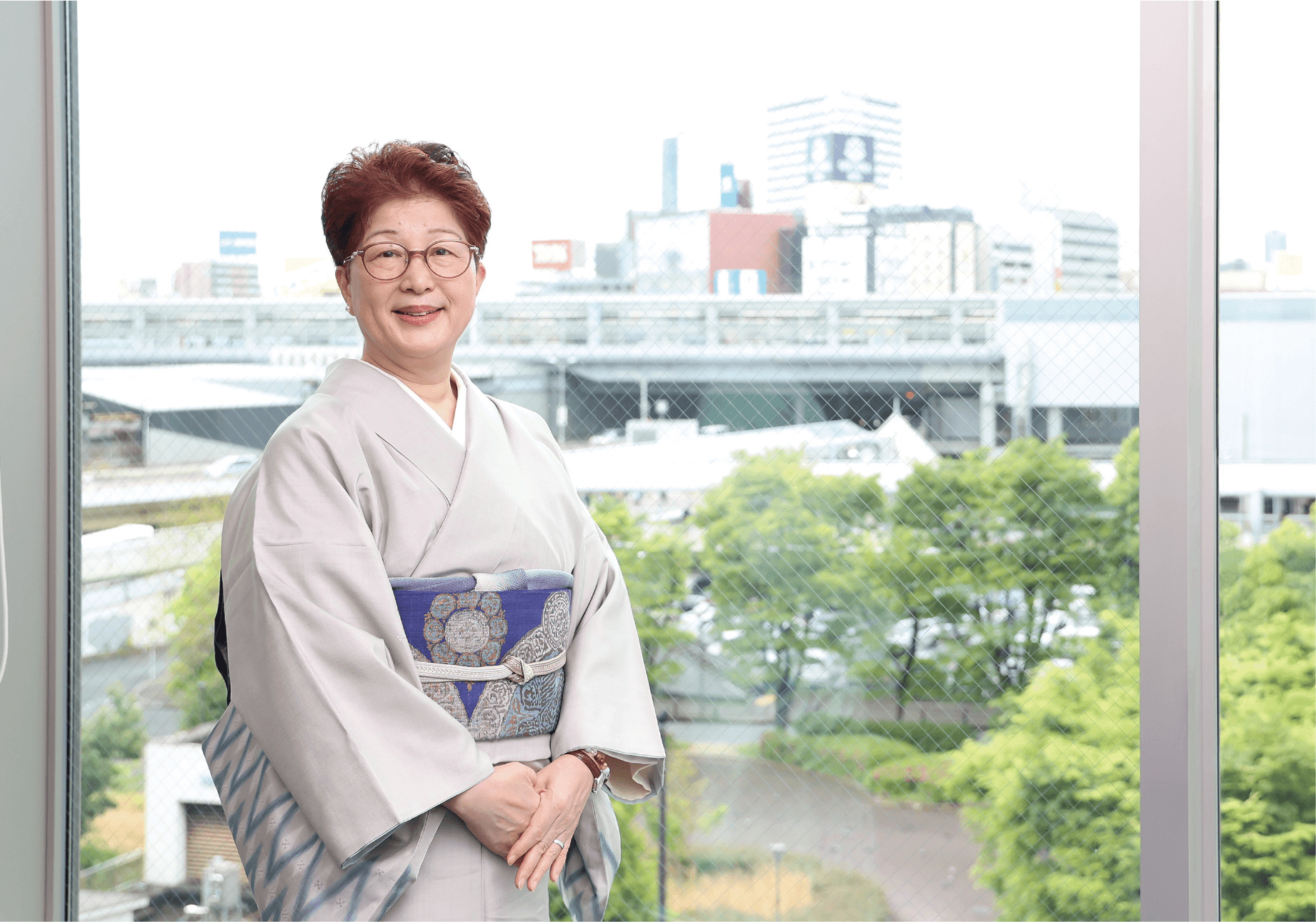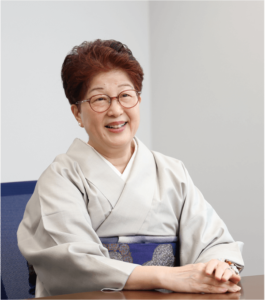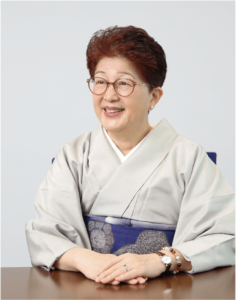Fuji Seal News
Management Message
President and CEO Message

Manufacturing and human
resource development leading to the
next 100 years

Shigeko OkazakiDirector, Representative Executive Officer Chairperson and CEO
Responsible manufacturing is an important value as a leading company
Looking back on FY2022, I feel that we were able to properly fulfill our supply responsibilities in response to customers’ needs in each business and region. However, because we were so focused on this, it took us too long to have our customers accept the passing on of rising material, utility, and logistics costs to them, resulting in lower profits despite obtaining higher sales numbers.
Regarding the passing on of costs, I think it is important not only to respond in a timely manner, but also to change our awareness. As a leading company, the Fuji Seal Group is committed to responsibly pursuing manufacturing practices that contribute to society and the environment. I believe that this is reflected in the acquisition of the gold medal awarded by EcoVadis, one of the world’s largest organizations that evaluates sustainability performance, and in the fact that we were highly rated in the “climate change” and “supplier management” categories scored by the CDP, an international environmental non-profit organization. Although these manufacturing efforts tend to be seen as free services, they involve development costs and other expenses, and above all, they enhance the value of our brand power.
In order to answer to the factory members who have been actively responding to difficult situations such as the Covid-19 pandemic, our prices must also reflect these efforts. I feel that management also needs to raise awareness of the value of these efforts in the future.
“Improvement of the working environment”and “speedy response to changes” are key for FY2023
Rapid acceleration of measures for human capital Developing strong leaders who learn from failure
As our company slogan indicates:, “We call creation a ‘dream.’ We call taking on the challenge to create ‘courage.’ We call a heated discussion on creation ‘trust,'” we value creativity and challenges and we always want to bring passion and excitement to our work, or “Waku-Waku” To create a framework for this purpose and to achieve sustainable growth, our “Human Resource Strategy” focuses on various measures centered on “respect for diversity,” “sharing values,” and “expansion of human capital.”
Of the approximately 6,000 employees in our group, two-thirds, or about 4,000, are foreign nationals. In order to recruit and develop our human capital from a more global perspective, in June 2022, we appointed a female Dutch national as our Executive Officer in charge of human resources. I believe that this is the most significant change under the new management system.
After assuming her position, she immediately began holding “Value Seminars.” The seminars aim to spread the “Fuji Seal Way,” which FSG has nurtured over our long 126-year history, and of sharing our values, during which managers serve as lecturers, sharing their experiences and insights, while participants take part in group discussions based on their understanding of the lectures. We plan to hold more sessions in various regions in the future.
She also developed a program incorporating FSG’s culture while collaborating with a Belgian business school. Directors and selected members from each region participated in the program, where they exchanged proposals and discussions about solutions to management issues.
In December, a new Diversity, Equity & Inclusion (DE&I) policy was established to ensure respect for diversity, and I feel that our human resource-related measures have been greatly enhanced. Of course, there are challenges, and we must immediately promote the development of human capital who will become next-generation leaders. We must first identify the issues within the current situation and make the appropriate proposals. We must create an environment where suggestions are heard and implemented.
The key point is how many high potentials*¹ we can develop within our employees who can make decisions with an eye on the next five to ten years.
I believe that a high potential is someone that has the ability to continue learning though failure during difficult assignments. I often wonder, “Am I the one who is making the most mistakes in the company? (laughs)” For instance, you cannot run a business just because you have an MBA*². Although theory is certainly necessary, I believe the important thing is to acquire the perseverance to continue no matter how many times you fail.
※1High potentials: Next-generation executive candidates
※2MBA: Master of Business Administration
Organizing and systematizing has dramatically improved the accuracy of judgements on intellectual property rights

By organizing and systematizing patent management that had until then been dispersed, the accuracy of judgments on intellectual property rights has improved, and it has become easier to pass them on to the next generation. As was the case with the human resource strategy, the person leading the intellectual property strategy is also a female employee. Like with them, FSG has fostered corporate culture in which women are naturally active in the frontlines of business.
Our employees’ sincere pursuit of value for our customers is our greatest strength
Our business is always centered on our customers, and I feel once again that we are a company that gives shape to customer requests with the help of our business partners.
FSG’s R&D and technical members do not wear white coats. This is because we ask our business partners to conduct the basic and technical research performed in white lab coats. So, why do customers choose us? This is because we work sincerely to face customer requests for “creation (development department), manufacturing (production department), and selling (sales department),” and deliver solutions from the standpoint of those involved. We deliver machines with good operating rates that satisfy our customers’ factory managers, and we provide proper maintenance. We propose how to make products stand out when they are lined up in a store. I believe that our employees’ sincere attitude to think first about what is valuable to our customers, is FSG’s greatest strength. The other day, I heard that one of our sales representatives was told by a major U.S. customer, “I thought Fuji Seal was a U.S. company.” That made me feel really happy. These words are proof that our business is centered on our customers, and I feel they encapsulate the reason for our strength.
A corporate culture that considers human capital as an important asset “Work-life balance” has been a priority for 40 years
This time, when looking through past materials, I realized that Masaaki Fujio, our founder and my own father, already had the vision of a company, individuals, and a family approximately 40 years ago, and mine aligned with his. He kept saying, “Work is fulfilling only when individual employees are happy, and their family understands the company.” In today’s terms, this refers to the work-life balance.
This idea is embodied in the Family Festival. Although it had been temporarily suspended due to the COVID-19 pandemic, it is an annual event held at each business location in Japan and abroad on May 12, the anniversary of FSG’s establishment. Starting by introducing the sentence, “Can you explain that judgment (action) of yours to your family (loved ones)?” written on our compliance cards, we present excellent employees, introduce the company, and teach children how shrink labels are made. In addition to this Family Festival, we have continued with employee-oriented initiatives for decades, such as sending birthday cards with handwritten messages to employees and their families. Our corporate culture considers human resources as the most important asset is the source of FSG’s growth.
In 1993, our founder also wrote the following phrases under the title “The Desirable Person”
- A: “Someone the Company Absolutely Desires”A person who consciously defines the remaining challenges and tackles them
- B: “Someone the Company Moderately Desires”A person who proactively detects latent problems and solves them
- C: “Someone the Company Can Do Without”A person who solves only the obvious and visible problems
- D: “Someone the Company is Better Without”A person who sees but does not solve the obvious and visible problems
- E: “Someone Who Should Leave the Company”A person who is complacent with the current situation, and does not see any obvious and visible problems although they exist (they are unquestionably everywhere)
Although the content is very strict what is intended here is that employees are expected to work with the attitude of consciously finding and revealing issues and challenges, and considers and implements solutions for them. To ensure that there are no misunderstandings, I communicate this message during morning assemblies and share it with our overseas members by translating it into English. I keep saying over and over again what is important and what I want to pass on to the next generation. Although this is a steady way, it isn’t a magic wand. I have also been sharing information about the Idea Bank Program whenever possible. Compared to last year, the number of applications increased an additional 655 in Japan and 3,700 overseas.
Carefully conveying our efforts and thoughts to gain a deeper understanding

Regarding our daily activities, we promote the clarification of responsibilities from both “an offensive” and “a defensive” perspectives. In terms of offensive activities, the Executive Officer in each business is responsible for offering technical proposals to customers and creating systems for recycling plastics. Meanwhile, in terms of defensive activities, the Executive Officer in each region takes responsibility for factory management and energy issues.
In addition to environment-related matters, we would like to further focus on corporate governance. Fuji Seal International works on governance and compliance with increased sensitivity while receiving checks from external parties such as Outside Directors and investors. However, Group companies closer to the forefront have not yet reached their full potential. Accordingly, from FY2023, we plan to create a governance and compliance structure, including the establishment of the Internal Audit Office. As the statement on the Compliance Card mentioned earlier goes, I believe that if each and every one of us raises our awareness, we will not make the wrong decision.
FSG has put into practice many ideas that are ahead of the times, as can be seen in our environmental initiatives and our corporate culture that values people. We will continue to carefully communicate these matters to all of our stakeholders. I believe that this is the first step to gaining a deeper understanding of FSG. In particular, I sincerely hope that our employees will be exposed to new aspects of our company that they may not have known before, and that this will encourage them to approach their work with a more joyful and upbeat mindset.